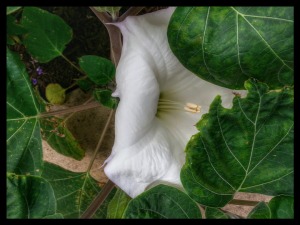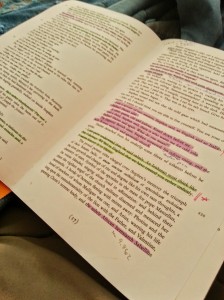A few brief bits of housekeeping before we get going: first, I have back-linked all the episodes of

Ulysses so far commented upon to the introductory blog post, which will now also serve as an index. It can be viewed here. Also, in many cases I have made some small tweaks to the writing to make the style slightly less bombastic or grandiloquent or I guess casual and more something my MA advisor wouldn’t have shaken his head at and dismissed out of hand. Still not perfect. Oh well. Also, for those of you who are sick of Ulysses, I should have another comic ready to go soon. The summer sabbatical was nice, but I am starting to feel like drawing again. Hooray? Also, you might have noticed that I moved all The Joy of Fishes-related links to this page. Just a reminder, if you read it, please consider reviewing it on Amazon or Goodreads. Thank you!
And now, Ulysses. Enjoy.
This section of Ulysses, “The Lotus Eaters,” takes its name from an episode in the Odyssey referred to somewhat briefly in chapter IX of Homer’s text. Odysseus and his men land on an island to get fresh water and food. Odysseus sends a few men into town to see what’s up. It turns out everyone on the island eats lotuses, and the lotuses are so delicious that once you taste them, you don’t want to do anything else but lie around eating lotuses all day. (Please make your own joke about the 1960s here.) Odysseus marches his men back onto the boat and gets out of there tout de suite.
In their 2000 film “O Brother, Where Art Thou?,” which happens to also be an adaptation of the Odyssey, the Coen brothers used the episode of the Lotus Eaters to refer to religion—specifically, as our heroes are wandering through the countryside, they come across a long line of (somewhat stoned- or hypnotized-looking) people dressed in white, waiting in line to be baptized.
Not coincidentally, although almost certainly unrelated to the Coen bros, this episode of Ulysses has a lot of religion in it. In fact, the whole book has a lot of religion—it’s set in Ireland, after all, a place where divorce was illegal until 1996[1] because of the influence of the Catholic church. But if you are about to quote Marx’s quip about religion being the opiate of the people and think we’re done, think again. This is Joyce—nothing is so uncomplicated.
In the first episode (Telemachus), we saw several different ideas about religion. Stephen, called a “fearful Jesuit” by Buck Mulligan, seems to believe in a deity he is unwilling to worship. Like Lucifer[2], at the end of Portrait, we get this scene between Stephen and his friend Cranly:
After a pause Cranly asked:
—What age is your mother?
—Not old, Stephen said. She wishes me to make my easter duty.[3]
—And will you?
—I will not, Stephen said.
—Why not? Cranly said.
—I will not serve, answered Stephen.
—That remark was made before, Cranly said calmly.
—It is made behind now, said Stephen hotly. (Portrait, 259–60)
Stephen claims that he “neither believe[s] in [the eucharist] nor disbelieve in it” (Ibid.), but his stance in Ulysses is a bit less equivocal, telling Haines, “You behold in me . . . a horrible example of free thought” (1.625–6). “Free thought” meaning “thought free from the dictates of ‘Christian revelation’ “ (Gifford 24). He is quite firm on this point, to the extent that he is unwilling to take communion to appease his dying mother. But as much as he makes these claims, he’s still very much in the grip of religion, seeing himself as well as “a servant of two masters . . . an English and an Italian. . . . The imperial British state . . . and the holy Roman catholic and apostolic church” (1.638–43). In fact, like Lucifer whom he quotes, Stephen is defined by religion and God, regardless of the latter’s existence; his desire to disobey the church brings him into much more strife than simply not caring about religion would—compare his refusal to take communion to appease his dying mother versus Bloom’s relaxing through a church service he doesn’t particularly understand or care to learn about.
In the first episode we also see Haines, who “couldn’t stomach that idea of a personal God. . .” (1.623), and Buck Mulligan, who is an irreverent medical student (as I already quoted, his feelings about death are put to Stephen like this: “And what is death . . . your mother’s or yours or my own? You saw only your mother die. I see them pop off every day in the Mater and Richmond and cut up into tripes in the dissectingroom. It’s a beastly thing and nothing else” (1.4–6)).
Finally we get to Mr Leopold Bloom. His attitude towards religion seems to stand somewhere between irreverence and ignorance.[4] For example, it is difficult to know whether or not he is joking when, watching a service, he muses, “Letters on his [the priest’s] back: I.N.R.I? No: I.H.S. Molly told me one time I asked her. I have sinned: or no: I have suffered, it is. And the other one? Iron nails ran in” (5.372–74). Similarly, he attributes the use of wine during the Eucharist ceremony to it being “more aristocratic than for example if he drank what they [the parishioners] are used to Guinness’s porter or some temperance beverage. . .” (5.387). During the mass he thinks of sex: perhaps he will meet Martha “one Sunday after the rosary” (5.375); imagines the priest murmuring to the communicants “Shut your eyes and open your mouth” (5.349–50); considers the confession process as a sadomasochistic ritual in which the confessor asks the priest to “punish me, please” (5.426); and imagines a woman confessing her infidelity (5.427–32). It should be noted that Bloom actually proposes the idea of the mass as an opiate during this section: “Good idea the Latin. Stupefies them first” (5.350–51) and sees the communicants as walking with “blind masks” (5.353) to take communion.[5]
What does this add up to? For Stephen (and probably for Mulligan, whose “Ballad of Joking Jesus” is showcased in several sections), religion is a source of creative energy if not comfort. For Bloom, it’s a source of mild interest. For none of them is it actually a sedative or distraction from the true woes of the world. But perhaps other things are—for example, Bloom ignores the gravity of the service to think about sex. While walking, he meets M’Coy, who is so wrapped up in preparing for a trip to the races that he will miss Paddy Dignam’s funeral (5.169–73). In another scene, Bloom calculates the amount of porter a local businessman must have sold in order to make a million pounds (answer: about 15 million gallons)—a lot of porter, and another common addiction (5.304–12). Bloom muses on drugs as well—cigars have “a cooling effect. Narcotic” (5.272), and the Chinese might prefer “an ounce of opium” (5.327) to learning about Christianity. All these things (sex, drugs, gambling) are in our modern time are commonly understood as things that one can become addicted to, which is to say that they can certainly be so distracting as to take one away from the duties of one’s life.
The message here is difficult to tease out, and of course different readers will draw different conclusions. Is Joyce suggesting that religion is problematic, but other things are problematic too? That “worldly” things like sex and gambling prove more of an opiate than religion? That somehow the removal of a deity from religion causes it to become one more distraction like any other? Any of the nice moral summaries I come up with sound pat, and I’m not convinced that Joyce actually believed any of them, since he notoriously indulged in both drink and sex himself (see for example Chiasson 2014). Ultimately there’s not an easy answer here, perhaps because there’s no author trying to pass judgment—although I’ve used the word “addiction” in the preceding paragraph, Joyce wouldn’t have, even were he alive today. This is just life—sometimes some things blind us to other things that are going on; preoccupied, we find ourselves unable to interact with every encounter the way that we should. In other words, perhaps everyone is an eater of lotuses.[6]
Notes
[1] As noted by (I’m sorry) Christopher Hitchens, the repeal of this law was opposed by, among others, Mother Theresa herself. (He noted this in several places; see for example his letter to the New York Review of Books here.) Also, I note from her Wikipedia page that she is now The Blessed Theresa of Calcutta, M.C., which is annoying because she’s from Macedonia.
[2] I’m not prepared to walk you through the mythology here. I suggest a reading of John Milton’s Paradise Lost. It’s a good book. Or, the relevant reference, as summarized in Portrait:
Lucifer, we are told, was a son of the morning, a radiant and mighty angel; yet he fell: he fell and there fell with him a third part of the host of heaven: he fell and was hurled with his rebellious angels into hell. What his sin was we cannot say. Theologians consider that it was the sin of pride, the sinful thought conceived in an instant: non serviam: I will not serve. That instant was his ruin. (126)
[3] “Easter duty” refers to “the obligation to receive Holy Communion at least at Easter time . . .” (Catholic Essentials website, quoting “A Catholic Dictionary, 1951”; link below). Receiving communion requires that one have confessed first as well, so Stephen’s mother is essentially requesting him to go through the whole ceremonial shebang. See http://catholicessentials.net/easterduty.htm.
[4] Bloom later comments that Christianity is “more interesting if you understood what it was all about” (5.423–24). It’s hard to know how to take the INRI remarks in view of this.
[5] It’s worth pointing out that Bloom’s attitude towards Judaism is typically more reverent—and tinged with remembrances of his father. See for example 7.206–13: “Poor papa with his hagadah book, reading backwards with his finger to me. Pessach. Next year in Jerusalem. Dear, O dear! All that long business about that brought us out of the land of Egypt and into the house of bondage Alleluia. Shema Israel Adonai Elohenu. No, that’s the other. Then the twelve brothers, Jacob’s sons. And then the lamb and the cat and the dog and the stick and the water and the butcher. And then the angel of death kills the butcher and he kills the ox and the dog kills the cat. Sounds a bit silly till you come to look into it well. Justice it means but it’s everybody eating everyone else. That’s what life is after all.” Sharp readers will note this is as slightly wrong as the earlier INRI (it’s not “into the house of bondage”), which certainly leads to more questions. However, the topic of Bloom’s (putative) Judaism exceeds this essay, so I will return to it at a later time.
[6] Having spent my past week hanging out with a bunch of actors, I feel pressed to add something about the performativity of the mass scene—the way in which the priest seems to be moving through a series of steps (suggested by him reading things off cards and the like) rather than truly engaged in the service. So, too, one could ask if the predictable actions of the parishioners are meant to suggest members of an audience, or even of a Greek chorus, performing some kind of specific role. But no space for that here. Perhaps another time.
References
Catholic Essentials. “Easter Duty.” 2008. http://catholicessentials.net/easterduty.htm.
Chiasson, Dan. “ ‘Ulysses’ and the Moral Right to Pleasure.” The New Yorker, 16 June 2014: http://www.newyorker.com/books/page-turner/ulysses-and-the-moral-right-to-pleasure.
Hitchens, Christopher. “Mother Theresa.” The New York Review of Books, 19 December 1996: http://www.nybooks.com/articles/archives/1996/dec/19/mother-teresa/.
Joyce, James. Portrait of the Artist as a Young Man: Edited with an Introduction and Notes by Seamus Deane. New York: Penguin Books, 1992.




